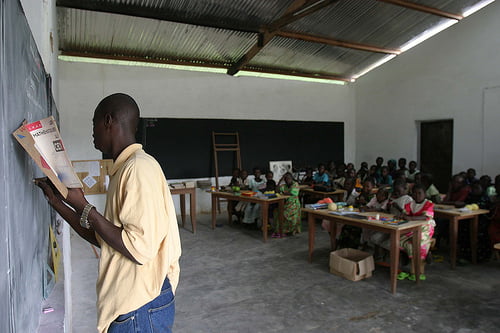

News
Africa told to invest heavily in education to ‘stop poverty transmission’
Delegates at the seventh annual Africa Economic Conference (AEC) yesterday highlighted the benefits of investing in “youth potential” across the continent.
African Development Bank president Donald Kaberuka told attendees of the event, which took place in Kigali, Rwanda, that Africa must begin to provide comprehensive and quality education in order to break the poverty chain.
“This is how you stop children from inheriting living conditions of debt, and once you do that you have stopped the transmission of poverty”, Kaberuka said.
United Nations Development Programme (UNDP) administrator, Helen Clark, who joined Kaberuka for a plenary session entitled Inclusive and Sustainable Development in an Age of Economic Uncertainty, backed up the African Development Bank’s president’s proposals.
“Africa’s dynamic youth population offers the opportunity for a huge demographic dividend. Young people are a source of innovation and creativity – given the opportunity”, she said.
“A visit to technology centres like Nairobi’s I-Hub for young ICT entrepreneurs leaves one’s head spinning with the ideas and possibilities spilling out of that base. Such young people are to be found across the continent.
“Investing in youth potential and the skills needed to drive agriculture and the manufacturing, processing, services, and logistics sectors will reap huge benefits.”
According to the Africa Progress Panel (APP), the proportion of primary school-aged children in Africa that are registered at a school rose from 60% in 2000, when the UN’s Millennium Development Goals were introduced to, amongst other things, achieve “universal primary education”, to 76% in 2009.
Over the same period, the number of children who weren’t registered with a school dropped from 42 million to 30 million.
These findings appear in a report called A Twin Education Crisis is Holding Back Africa, published last month by the APP, a group that consists of 10 individuals who discuss important issues relating to Africa and includes Kofi Annan and Bob Geldof.
However, despite the encouraging shifts towards widespread access to primary education, the panel’s report claims that by 2025, some 17 million children will still be out of school – a decade after the UN’s target for worldwide education.
Education spending currently averages around 5% of Africa’s GDP, but a greater figure is needed in order to ensure sustainable and equal futures for the continent’s inhabitants.
“Education is where sound economics and ethical imperatives come together to make an overwhelming case for action in favour of jobs and of justice”, the APP report said.
“Good quality education is a solid investment with high rates of return in terms of economic growth and employment creation.
“And learning is the birth right of all African children, irrespective of their circumstances.”
Further reading:


 Environment12 months ago
Environment12 months agoAre Polymer Banknotes: an Eco-Friendly Trend or a Groundswell?

 Features11 months ago
Features11 months agoEco-Friendly Cryptocurrencies: Sustainable Investment Choices

 Features12 months ago
Features12 months agoEco-Friendly Crypto Traders Must Find the Right Exchange

 Energy11 months ago
Energy11 months agoThe Growing Role of Solar Panels in Ireland’s Energy Future




























